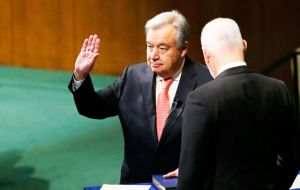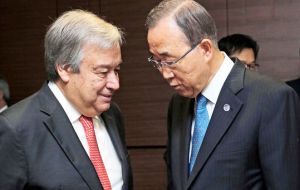MercoPress. South Atlantic News Agency
Guterres sworn in as UN Secretary General: pledges more delivery and less on process
 Guterres said he would make conflict prevention his top priority. “Where prevention fails, we must do more to resolve conflicts,” he said
Guterres said he would make conflict prevention his top priority. “Where prevention fails, we must do more to resolve conflicts,” he said  U.N. member states also held a tribute to Ban Ki-moon, who has led the organization for the past decade.
U.N. member states also held a tribute to Ban Ki-moon, who has led the organization for the past decade. Portugal's António Guterres was sworn in Monday as the ninth U.N. secretary-general. “The United Nations needs to be nimble, efficient and effective,” Guterres told member states. “It must focus more on delivery and less on process; more on people and less on bureaucracy,” he said.
The 67-year-old former prime minister (1995-2002) and U.N. refugee chief (2005-2015) beat out more than a dozen other candidates during a 10-month long public process to lead the organization.
With the world facing its largest refugee and migrant crisis since World War II, numerous armed conflicts in the Middle East and Africa, the threat of terrorism, and the effects of climate change, Guterres will have a full plate when he takes up his duties on January 1 from outgoing U.N. chief Ban Ki-moon.
“The U.N. must be ready to change,” Guterres said. “Our most serious shortcoming — and here I refer to the entire international community — is our inability to prevent crises,” he said. “The United Nations was born from war. Today we must be here for peace,” he said.
Guterres said he would make conflict prevention his top priority. “Where prevention fails, we must do more to resolve conflicts,” he said, adding he would use his good offices to personally engage in conflict resolution where it brings “added value.” He also called for mediation, arbitration and creative diplomacy for addressing crises.
During a post-ceremony news conference, Guterres was asked what he would do about the situation in Syria. He said he hopes to be an “honest broker, creating the conditions for confidence to be established” to find a solution.
“This is a war in which nobody is winning; this is a war in which everybody is losing,” Guterres said. “This became a threat for everybody around the world; it is high time to put an end to this nonsense.”
U.N. member states also held a tribute to Ban Ki-moon, who has led the organization for the past decade. They praised his stewardship of the organization through a global financial crisis, conflicts, natural disasters and outbreaks of disease, and they gave him a standing ovation.
Over his tenure, Ban has often referred to his own upbringing and the role the United Nations played in his youth, in struggling post-war Korea.
“After the Korean War, U.N. aid fed us; U.N. textbooks taught us; U.N. global solidarity showed us we were not alone,” he said. “For me, the power of the United Nations was never abstract or academic,” said Ban.
“It is the story of my life, and many Korean people,” he continued. “It is a story of many millions, and millions of people around the world, many children, young boys and girls.” He said his profound appreciation for the organization only grew stronger during his tenure.
“For the past 10 years, I have been honored to serve alongside the many courageous, dedicated and talented women and men of the United Nations,” he said.
“Even as I prepare to leave, my heart will stay as it has since I was a child — right here with the United Nations,” he said.
Ban's term will expire at the end of this month. He will return to his native South Korea in mid-January, where there is widespread speculation he may run for president.




Top Comments
Disclaimer & comment rulesCommenting for this story is now closed.
If you have a Facebook account, become a fan and comment on our Facebook Page!